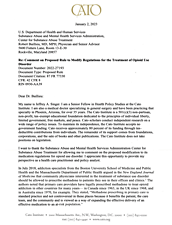Dear Dr. Baillieu:
My name is Jeffrey A. Singer. I am a Senior Fellow in Health Policy Studies at the Cato Institute. I am also a medical doctor specializing in general surgery and have been practicing that specialty in Phoenix, Arizona, for over 35 years. The Cato Institute is a 501(c)(3) non-partisan, non-profit, tax-exempt educational foundation dedicated to the principles of individual liberty, limited government, free markets, and peace. Cato scholars conduct independent research on a wide range of policy issues. To maintain its independence, the Cato Institute accepts no government funding. Cato receives approximately 80 percent of its funding through tax-deductible contributions from individuals. The remainder of its support comes from foundations, corporations, and the sale of books and other publications. The Cato Institute does not take positions on legislation.
I want to thank the Substance Abuse and Mental Health Services Administration Center for Substance Abuse Treatment for allowing me to comment on the proposed modification to its medication regulations for opioid use disorder. I appreciate this opportunity to provide my perspective as a health care practitioner and policy analyst.
In July 2018, addiction specialists from the Boston University School of Medicine and Public Health and the Massachusetts Department of Public Health argued in the New England Journal of Medicine that community physicians interested in the treatment of substance use disorder should be allowed to prescribe methadone to patients they see in their offices and clinics. The authors noted that primary care providers have legally prescribed methadone to treat opioid addiction in other countries for many years— in Canada since 1963, in the UK since 1968, and in Australia since 1970, for example. They stated, “Methadone prescribing in primary care is standard practice and not controversial in these places because it benefits the patient, the care team, and the community and is viewed as a way of expanding the effective delivery of an effective medication to an at-risk population.”
I have written in support of the idea, which would allow practitioners to dispense take-home medication to people receiving treatment for opioid use disorder. In January 2020, the National Academy of Science, Engineering, and Medicine (NASEM) made a similar plea. In May of 2022, Zoe Adams et al. made a compelling case for allowing primary care practitioners and other licensed health care practitioners to treat people with opioid use disorder, prescribe take-home methadone, and follow such patients in their regular “mainstream” clinics. Pilot programs in the United States have shown that this approach can be safe and effective.

This work is licensed under a Creative Commons Attribution-NonCommercial-ShareAlike 4.0 International License.

